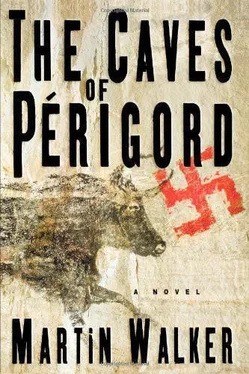Martin Walker - The Caves of Perigord
Здесь есть возможность читать онлайн «Martin Walker - The Caves of Perigord» весь текст электронной книги совершенно бесплатно (целиком полную версию без сокращений). В некоторых случаях можно слушать аудио, скачать через торрент в формате fb2 и присутствует краткое содержание. Жанр: Триллер, на английском языке. Описание произведения, (предисловие) а так же отзывы посетителей доступны на портале библиотеки ЛибКат.
- Название:The Caves of Perigord
- Автор:
- Жанр:
- Год:неизвестен
- ISBN:нет данных
- Рейтинг книги:4 / 5. Голосов: 1
-
Избранное:Добавить в избранное
- Отзывы:
-
Ваша оценка:
- 80
- 1
- 2
- 3
- 4
- 5
The Caves of Perigord: краткое содержание, описание и аннотация
Предлагаем к чтению аннотацию, описание, краткое содержание или предисловие (зависит от того, что написал сам автор книги «The Caves of Perigord»). Если вы не нашли необходимую информацию о книге — напишите в комментариях, мы постараемся отыскать её.
The Caves of Perigord — читать онлайн бесплатно полную книгу (весь текст) целиком
Ниже представлен текст книги, разбитый по страницам. Система сохранения места последней прочитанной страницы, позволяет с удобством читать онлайн бесплатно книгу «The Caves of Perigord», без необходимости каждый раз заново искать на чём Вы остановились. Поставьте закладку, и сможете в любой момент перейти на страницу, на которой закончили чтение.
Интервал:
Закладка:
“You’re just going to have to remember how to dodge them, Jacquot,” said Manners, relieved to have a name for the man. “I rely on the old soldiers like you to teach the young ones how to do it.” He put his empty glass on the table, thanked Boridot, and turned to go. Sybille rose too, and in automatic courtesy, he asked if he could escort her anywhere.
“You seem determined to get me arrested, monsieur,” she laughed, as he helped her don a thick jacket of black wool. “Yes, I’d be pleased if you rode with me. But if we see any Germans, you have to promise to jump over the hedge.”
“No bloody Germans round here,” called Jacquot as they left. “We killed the bastards.”
They rode in single file up the cart track, her bicycle even older than his, but well cared for, the chain oiled and no rust on the wheel rims. He rode behind her, looking at the neat ankles that disappeared into her boots, the well-shaped rump above the basket that was tied above the rear wheel, filled with the straw to protect the eggs Boridot had given her.
“I can’t give you any parachute silk,” he said as they reached the wider track and he could pedal along beside her. “It’s a firm rule. Security, you understand.” She snorted. “But I promise to buy you a set of the finest silk lingerie in Paris when this war is over.”
“Very well, monsieur, I will accept that as my fee for treating Jacquot and all the others I fear you will be sending me. You must buy them from Lanvin, if you please. And how many Frenchwomen have you promised such a gift?”
“Just you. I’m not sure I could afford the amount of silk that some of these farmers’ wives might need. A lot of them seem to take very large sizes.”
“That’s an insult to French womanhood,” she replied, and he couldn’t tell if she were joking. She spoke again. “I won’t ask where you are heading, but you’d better wait before we reach the road to le Bugue, and then follow me. There may be a Milice patrol. I presume you have papers-you had better tell me the name on them.”
“I think I should turn off before le Bugue, rather than ride through it,” he said. “The name on my papers is Alain Guyon, but I’d like you to know my real name-Manners, Jack Manners.”
“Jacques. But to be known as Alain,” she said. “Well, Jacques, if you don’t follow me you’d miss the chance of a perfect omelet, and I’d miss the chance of another of your cigarettes.” She grinned at him, and suddenly she did not look plain at all. “I can imagine the kind of food you boys make for yourselves. Come back and eat. Go through the town and past the church to the square where the men play boules . Just across the street you’ll see the sign for the vet. Use the surgery entrance. I’ll put up the ‘closed’ sign if there’s any sign of trouble.”
“Now you wait here until I’m out of sight,” she added. “And one more thing, Monsieur Jacques.”
“Yes,” he said, nervously, not sure of himself now that she had suddenly taken charge.
“You might want to hide your gun before you cycle into the town.”
CHAPTER 10
Time: The Present
The Chateau Malrand looked imposing as they first drove up the long gravel drive from the road, but then it seemed curiously to get smaller the closer they approached. It was not at all as grandiose as Lydia had expected of the country residence of the President of France. Her sense of proportion was jolted again as she suddenly realized that the drive was taking them past the formal garden and what she had not realized was the rear of the building, and around the side to deposit them abruptly into the entrance yard. What from the rear had been a reasonably proportioned seventeenth-century building with three stories and a turret with a pointed spire became from the front something shrunken. There was a narrow, almost mean little door on the ground floor into the base of the turret. And then a stone staircase began by being as wide as their car and then shrank to the width of a single person as it reached the main entrance on the first floor. It was topped incongruously by a small glass portico, an afterthought to keep off the rain while waiting for the door to be answered.
As Manners parked the Jaguar, Lydia looked behind her and realized that the real entrance drive had come that way, from the river and what must once have been the road along the river’s bank. The glint of the Vezere lay perhaps a quarter mile down a handsome avenue of trees, which were flanked on one side by vines and on the other by an orchard of neatly pruned apple and pear trees. Before the trees began, an outbuilding in bright new stone overwhelmed the old stables. They had already passed one guard post as they had left the road. This was clearly another, with three big, black Citroens parked alongside it, and three tough-looking young men leaning too casually against them. In the doorway of the new building, a big bald man with a thick stripe of mustache cupped his hand to his ear, listened attentively, and then nodded at them. As Lydia looked again at the front of the chateau, realizing that this had once been a small medieval fortress before the Renaissance window had been knocked into its facade, and before some seventeenth-century Malrand had rebuilt the rear, the front door seemed to open by itself. The effect was almost eerie, until a maid appeared, tucking her hair into a white starched bonnet, to guide them in.
Malrand awaited them in a large and rather cold room that ran the entire width of the house. He stood smoking a yellow cigarette before his Renaissance window, dressed as if going for a stroll, in sturdy brogues, corduroy slacks, and a tweed jacket, his checked shirt open at the neck. His clothes were somehow familiar. Lydia suddenly recalled a rather grand shop on one of the Paris boulevards just by the Madeleine called Old England, and her curiosity was satisfied. He looked just like one of the window displays. His hair was thick and white, his face strikingly pale apart from the sharp redness of his cheeks; his thin nose and lips gave him a hawkish look. He appeared far more intense and less tranquil than his photographs in the newspapers, as if still full of a youthful nervous energy.
“Welcome to my home, Major Manners. It is over fifty years since your father first stood where you are now,” he said genially in excellent English, his voice like gravel after a lifetime of smoking, as he advanced upon them with hand outstretched. “I knew that you were accompanied, but had not known that we were to be honored by the presence of such a lovely woman.” He took Lydia’s hand, bowed slightly, and raised it to within an inch of his lips. “Mademoiselle, a perfect English rose.”
“American, Monsieur le President, and honored to meet you.”
“American? Then this is almost like old times. A Malrand, a Manners, and an American, here in the old chateau, just as we were when we first landed back in 1944. It would be too much of a coincidence, mademoiselle, for your name to be McPhee?”
“Too much indeed, Monsieur le President. My name is Dean,” she said, a little irritated. His security men would not only know her name and nationality but he had probably checked out her ancestry, her education, and her tastes in everything from food to music.
“Mademoiselle Dean,” he said. “An Anglo-Saxon rose. Have a glass of champagne, and come and admire my new vineyard. We now have some decent wine again, for the first time in over a hundred years. You know about the phylloxera, the disease that wiped out so many of our vineyards in the time of Napoleon the Third? In Bordeaux and Burgundy, they were wise enough to replant with good American vines from California, which resisted the disease. In these parts, they decided there was more money in tobacco. A great mistake. So the only wine we grew here was our own pinard, the rough stuff that used to be given to the soldiers when they got two liters a day as part of the rations. We drank it ourselves, too. More fool us.”
Читать дальшеИнтервал:
Закладка:
Похожие книги на «The Caves of Perigord»
Представляем Вашему вниманию похожие книги на «The Caves of Perigord» списком для выбора. Мы отобрали схожую по названию и смыслу литературу в надежде предоставить читателям больше вариантов отыскать новые, интересные, ещё непрочитанные произведения.
Обсуждение, отзывы о книге «The Caves of Perigord» и просто собственные мнения читателей. Оставьте ваши комментарии, напишите, что Вы думаете о произведении, его смысле или главных героях. Укажите что конкретно понравилось, а что нет, и почему Вы так считаете.












